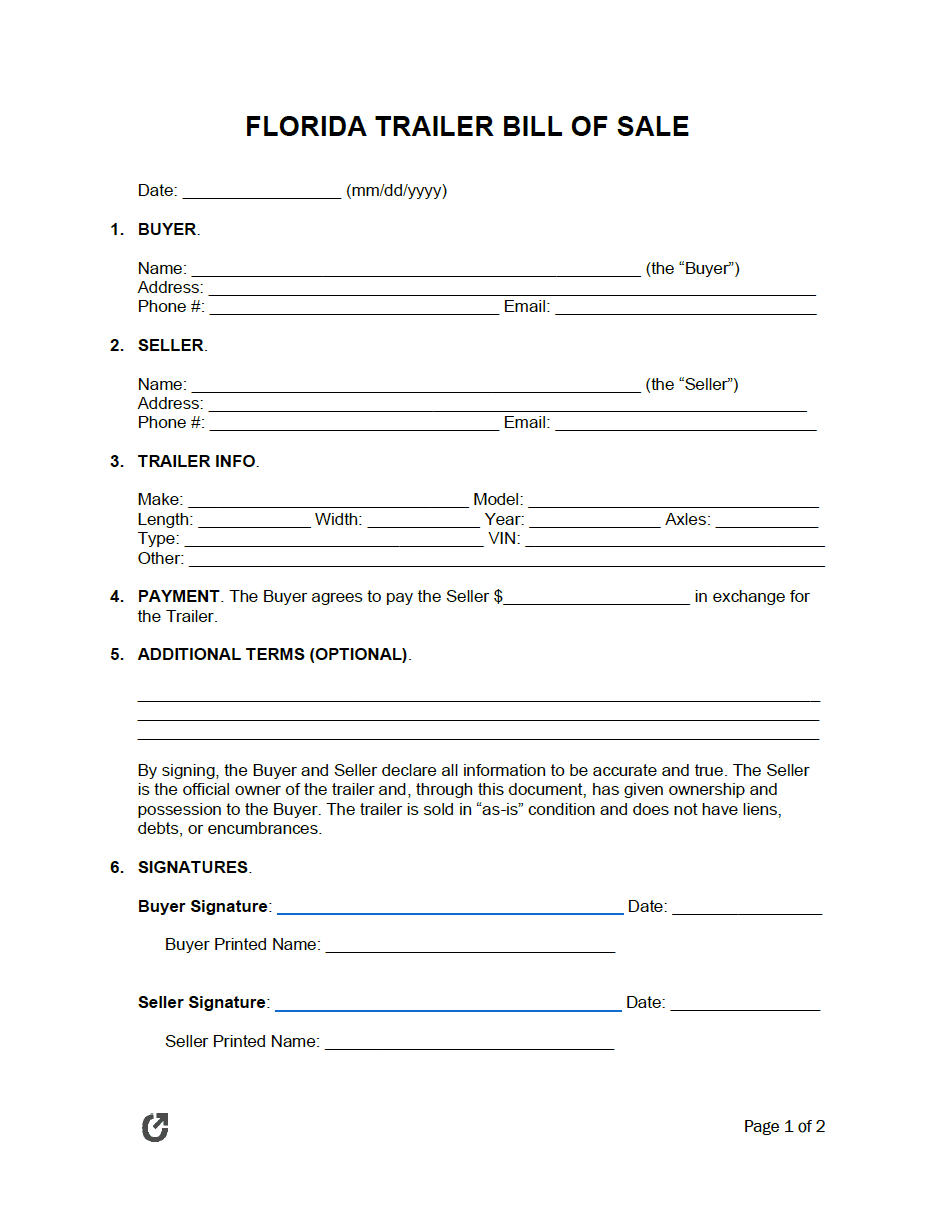Florida Trailer Bill of Sale Form
A Florida trailer bill of sale form envelops the happenings of a trailer transaction. It defines the carrying platform and its main features. The document also provides evidence of the monetary exchange between a buyer and seller. Either party can use the form in a court of law if the need ever arises.
|
County Versions
What is a Florida Trailer Bill of Sale?
A Florida trailer bill of sale incorporates information about the trailer, buyer, and seller into a single document. Each named person must carry out their role in the listed manner. If either individual defies the terms of the arrangement, they become legally liable. Therefore, the buyer and seller must fully understand the agreed-upon conditions before signing.
Individuals primarily use the form for trailers that carry cargo, recreational items, or animals. Utility, boat, and farming trailers fall under this category. Residents should use the document for private use trailers but should not use it for semi-trailers or commercial uses.
How to Register a Trailer (3 Steps)
All trailers in Florida must have a registration, regardless of their type and weight. Trailers weighing under 2,000 pounds do not need a title. Registration (and/or titling) needs to occur within thirty (30) days after the owner acquires it. The resident must visit a service center to carry out registration and titling matters.
Step 1 – Determine Residency Status
Full-time residents who live in Florida must register their trailer with the FLHSMV. Non-residents must register in the state if their:
- Trade or occupation occurs in Florida;
- Job is in Florida; and/or
- Children go to public schools in Florida.
Exemptions apply if a student attends a Florida college full-time or spends less than six (6) months in the state for a pre-approved work-study program.
Step 2 – Register the Trailer
The registration and titling requirements differ according to the trailer’s weight and intended use. Owners must provide additional forms depending on if they bought it in new or used condition. When making an appointment through their local office, they should inquire about the required documents for up-to-date information.
Under 2,000 pounds
The FLHSMV requires the documentation listed below for new, used, and homemade trailers weighing less than 2,000 pounds. Carrying platforms under this category need registration but not a title.
| New | Dealerships take care of the titling and registration process for customers. The buyer and dealer complete the registration application and bill of sale together. Then, the company submits the application, manufacturer’s certificate of origin, bill of sale, lienholder information, registration, and payment to the service center. |
| Used | Used trailers under 2,000 pounds with a Florida registration require a completed and signed bill of sale form. The document must include the trailer identification or license plate number. If the used trailer does not have a Florida registration, the owner must provide the bill of sale with the trailer identification number, previous registration state, year, and make or the out-of-state title signed by the seller. They must also provide a weight slip if the gross weight is not on the title or registration. |
| Homemade | Owners of used previously registered, homemade trailers weighing under 2,000 pounds must present the bill of sale with the trailer identification or license plate number. They can also provide the previous owner’s registration instead of the bill of sale. If the previous owner did not register the homemade trailer, the bill of sale form must contain the trailer’s year and weight. |
2,000 pounds or more
Owners must submit the following forms for new, used, and homemade trailers weighing 2,000 pounds or more. Trailers of this size require a Florida title and registration.
| New | Dealers and customers complete and sign the required forms together. Then, the sales associate sends the necessary information to the state. Generally, they give the owner temporary plates, which they can use until they receive their official title and registration. |
| Used | Owners of used trailers weighing over 2,000 pounds must submit a bill of sale, including the trailer’s year, make, identification number, and previous state. Instead, they can also provide the out-of-state registration and title signed by the seller. If the weight is not on the title or registration, they also need a weight slip. |
| Homemade | Previously registered, homemade trailers with a weight of 2,000 or more require the title from the past owner and the bill of sale. If the seller did not title the trailer, the new owner needs to take it to an inspection station. The examiner gives it a trailer identification number, which the state needs as proof of assessment. |
Out-of-State
Incoming residents with out-of-state trailers must apply for a title in Florida. The owner must provide the application for certificate of title, out-of-state title, lienholder information (if applicable), and current tags or license plates. They must also pay standard registration fees and sales tax charges.
Step 3 – Renew
Trailer owners must renew their registration before expiration, which occurs at midnight on their birthday. Renewals can happen online, by mail, or at an office.
By law, Florida does not have to issue renewal notices to residents. Therefore, individuals must keep the expiration date in mind to ensure they renew before the end date. However, tax collectors often send reminders three (3) weeks before expiration.
| Mailing Address: |
| Florida Department of Highway Safety and Motor Vehicles Neil Kirkman Building 2900 Apalachee Parkway, MS 58 Tallahassee, FL 32399 |
